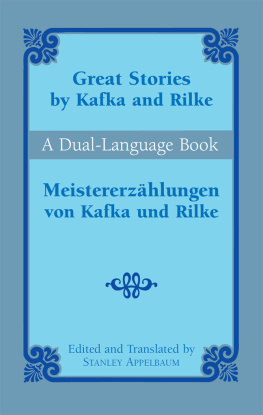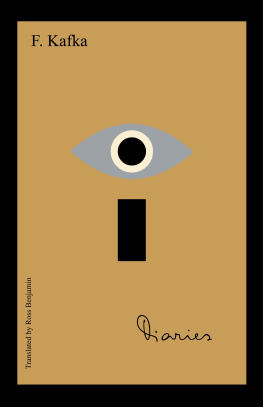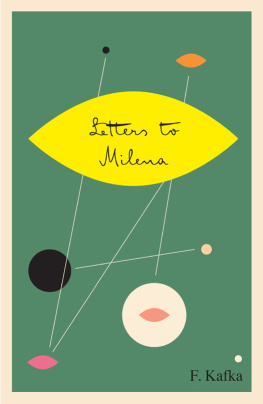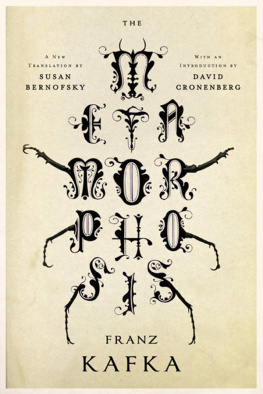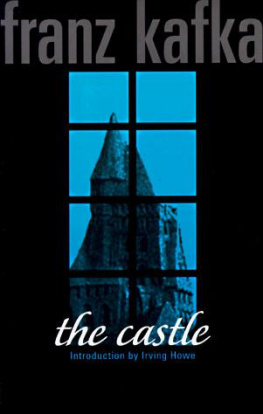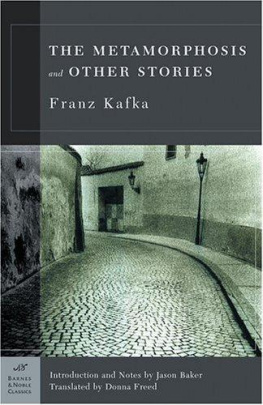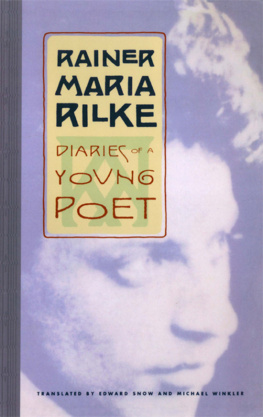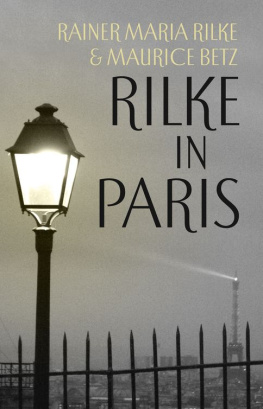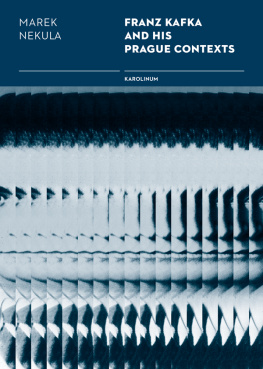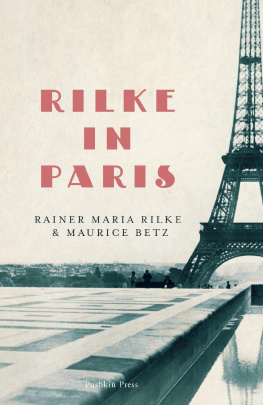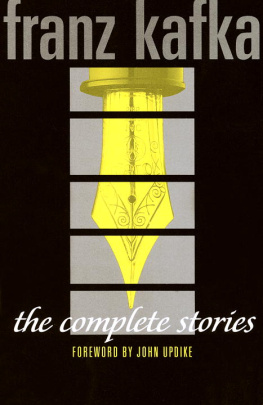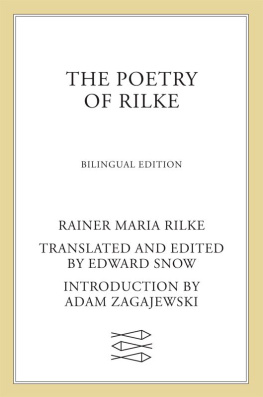Great Stories by
Kafka and Rilke
Meistererzhlungen von
Kafka und Rilke
FRANZ KAFKA
RAINER MARIA RILKE
A Dual-Language Book
Edited and Translated by
STANLEY APPELBAUM
DOVER PUBLICATIONS, INC.
Mineola, New York
Copyright
English translation, Introduction, and footnotes copyright 2003 by Dover Publications, Inc.
All rights reserved.
Bibliographical Note
This Dover edition, first published in 2003, is a new selection of stories by Kafka and Rilke, presented in the original German text, reprinted from standard editions (the dates of first publication range from 1902 to 1922; see the Introduction for detailed bibliography), together with new English translations by Stanley Appelbaum, who also furnished the Introduction and footnotes.
Library of Congress Cataloging-in-Publication Data
Kafka, Franz, 18831924.
[Short stories. English & German. Selections]
Great stories by Kafka and Rilke = Meistererzhlungen von Kafka und Rilke : a dual-language book / Franz Kafka, Rainer Maria Rilke ; edited and translated by Stanley Appelbaum.
p. cm.
ISBN 0-486-43197-5 (pbk.)
I. Title: Meistererzhlungen von Kafka und Rilke. II. Rilke, Rainer Maria, 18751926. Short stories. English & German. Selections. III. Appelbaum, Stanley. IV. Title.
PT2621.A26A225 2003
833.912dc21
2003053286
Manufactured in the United States of America
Dover Publications, Inc., 31 East 2nd Street, Mineola, N.Y. 11501
Contents
INTRODUCTION
Kafka and Rilke, two titans of early twentieth-century German literature, one Jewish, the other Catholic, were both born in Prague when Bohemia was still a part of the Austro-Hungarian Monarchy, ruled from Vienna. The city was characterized by a social dichotomy after the pan-European revolution year of 1848: the Germans and Jews concentrated on industry and trade, while the Czechs were principally farmers and laborers. But by 1880, in an irreversible trend, the Czechs had captured the majority in the local government, and the Germans were increasingly marginalized. In this twilight just before and after 1900, however, the German writing in the city experienced a kind of golden age, being represented not only by the two authors in this volume, but also by such others as Franz Werfel, Max Brod, and Gustav Meyrink. Prague was extremely cosmopolitan, drawing talent from all around. Much of the writing was experimental, and Kafka and Rilke were by no means the only purveyors of fantasy and the supernatural.
Kafka
Life. Franz Kafka was born in 1883. His father was a merchant whose object lessons in arbitrary tyranny shaped his sons psyche and literary production. After a good secondary education Kafka entered the local German university, the Karl-Ferdinand, in 1901. There in 1902 he met Max Brod (18841968), who was to be his lifelong friend and adviser, then his literary executor. After receiving a law degree in 1906, Kafka became a clerk in an insurance firm, while trying his hand at writing (he had begun by at least 1904). The year 1908 was not only that of his first small publication, but also that of his joining a semi-governmental insurance company that handled workmens accident claims. He remained with the firm for the next fourteen years, and, apart from a few journeys abroad (the first in 1909), his biography consists chiefly of his authorial activities. He never married (he broke off all three of his engagements, two of them to the same woman), and he lived with his parents until he was over thirty.
The year 1912 was crucial for him; he considered one of the stories he wrote that year, Das Urteil (usually rendered as The Judgment, though The Sentence, or even The Verdict, would be a better translation), as his breakthrough, the proof that he was justified in seeking fame as an author; in the same year he also began the never-finished novel that would eventually be published as Amerika (he continued working on it into 1914), and wrote what is probably his most famous story, Die Verwandlung (The Metamorphosis; The Transformation would be a closer translation, because German possesses the word Metamorphose, which he could easily have used, had he so chosen). Das Urteil was published in 1913 (periodical) and 1916 (volume), Die Verwandlung in 1915 (both forms).
In 1914 he wrote the story In der Strafkolonie (In the Penal Colony; published 1919) and began his novel Der Proze (The Trial, on which he worked into 1916). In 1916 and 1917 he wrote most of the stories that were to be included in the 1919 volume Ein Landarzt (A Country Doctor), twelve of which are included in this Dover edition. In 1917 he was diagnosed with tuberculosis, and began taking medical leaves from his job; he was to visit a number of clinics and sanatoriums. By 1920 he was no longer working regularly as a claims investigator, and in 1922 he took early retirement with a pension.
By 1921 he had begun writing his novel Das Schlo (The Castle). In 1923 he moved to Berlin to work as a free-lance author; in that year he prepared a new volume of short stories, Ein Hungerknstler (A Hunger Artist) for publication (two stories from that collection, already published in magazines in 1922, complete the Kafka selections in the present volume). He died in 1924 while still reading proof of that volume, which appeared shortly after his death.
Brod, his literary executor, apparently disobeyed Kafkas last wishes by saving, and eventually publishing, the papers he had left behind. Thus, most of Kafkas work was published posthumously: all three novels, about two thirds of his stories and small prose pieces, extensive diaries, and a large number of letters.
In German-speaking lands, Kafka was a seldom-read cult figure before 1933, when his work was suppressed. Extensive fame first came to him in France and in the United States during the Second World War. Since that war, he has been acclaimed as an international figure of the first rank, a master of fantasy and a major spokesman for twen tieth- century man, his terror, confusion, and anguish under the pressure of the worlds intrusiveness and his own consciousness.
The Stories Included Here. Of the fourteen stories in this Dover volume, twelve (in their original sequence) are from the volume Ein Landarzt. Kleine Erzhlungen (A Country Doctor. Brief Stories), first published in 1919 by the Kurt Wolff Verlag, Munich and Leipzig. The original volume also contained the title story, Ein Landarzt, as its second item and, as its last, the story Ein Bericht fr eine Akademie (A Report to an Academy). Though Kafka himself referred to these pieces, written from 1915 to 1917, as Geschichten, as well as Erzhlungen, not all of them are what we would normally call stories, some could be designated as sketches, parables, or character studies.
Several of Kafkas letters to the publisher throw light on the genesis of the volume:
In a letter of July 7, 1917, Kafka states that he is sending thirteen items written during the preceding winter, adding, in one of his frequent fits of self-doubt, Theyre far from being what I really intended.
A letter of July 27, 1917, reveals that the publisher was pleased; now Kafka is sending him Ein Traum, and he suggests including Vor dem Gesetz, which had already appeared in an Almanach (annual sampler volume) of the Kurt Wolff Verlag.
On August 20, 1917, Kafka supplies a list of contents, which includes all fourteen items eventually published in the volume, in their final sequence, but also another story, as third on the list: Ein Kbelreiter (later translated as The Bucket Rider). This piece was first published in the December 25, 1921 issue of
Next page
